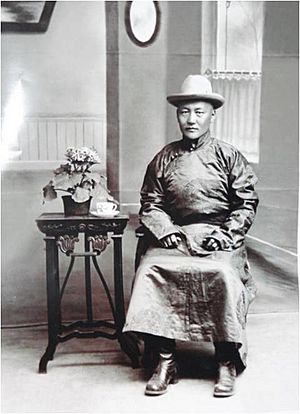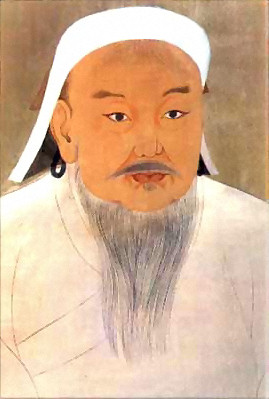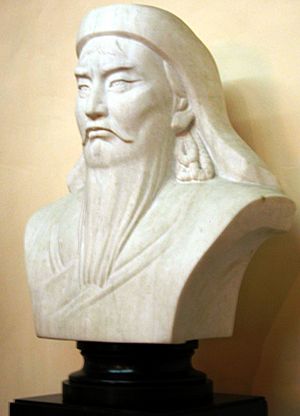Khan (title) facts for kids
A Khan (pronounced like "kahn") is an old title from Central Asia for a powerful leader or military ruler. It's like calling someone a king, prince, or commander. The Mongols made this title famous as they built their huge empire across Asia.
Today, you'll mostly find the title Khan in places like South Asia, Central Asia, and Iran. For women, the similar titles are Khatun and Khanum.
What is a Khan?
In the past, Khans were leaders of smaller groups or tribes, often living in the wide open lands of Mongolia and northern China. These nomadic people, who moved from place to place, often became very strong militarily. They sometimes even threatened big empires like China and kingdoms in Central Asia.
A Khan rules over an area called a khanate. Sometimes, the title "Khan" is simply translated as a king or prince when talking about a ruler of a kingdom.
The title "Khan" became very well known because of a powerful Mongol leader named Temüjin. He was a brilliant military leader who created the Mongol Empire. This empire was the largest land empire the world has ever seen!
Genghis Khan's full title was actually khagan, which means 'Khan of Khans'. This is similar to saying 'King of Kings' or 'Great Khan'.
Different Kinds of Khans
Over time, the title "Khan" has been used in different ways. For example, during the time of the British Raj (when Britain ruled India), titles like Khan Bahadur or Khan Sahib were given as special honors.
These titles were given to Muslim people who showed great bravery or did important services for their country or government. A similar title for Hindu people was Rai Bahadur or Rai Sahib. These honors were often added to a person's name, either before or after it.
Related Titles
Images for kids
-
Eurasia around the year 1200, just before the Mongol invasions began.
-
A map showing the largest size of the Mongol Empire, outlined in red. The Timurid Empire is also shown.
-
Two Khans in Turkoman Tribal Costume, from a collection of old photographs at the Brooklyn Museum.
See also
 In Spanish: Kan para niños
In Spanish: Kan para niños
 | Jackie Robinson |
 | Jack Johnson |
 | Althea Gibson |
 | Arthur Ashe |
 | Muhammad Ali |







